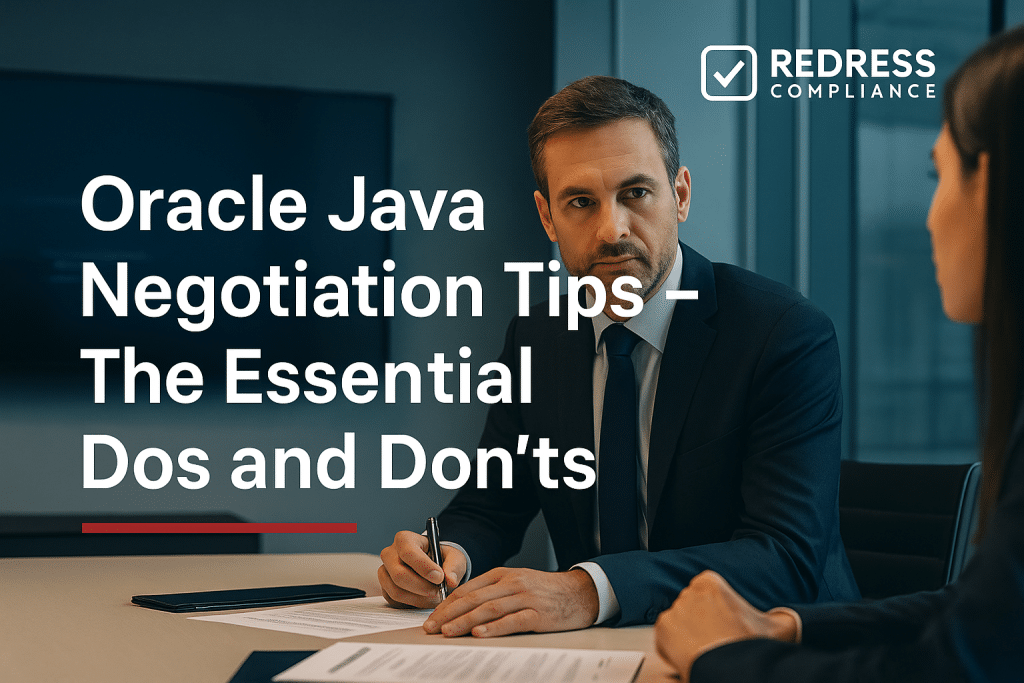
Oracle Java Negotiation Tips
Oracle Java negotiations are short on time, high on pressure, and full of tactics.
Now, this quick-reference checklist distills those insights into a decisive set of Dos and Don’ts to protect your organization’s position in any Java renewal discussion. Use it as a last-minute briefing or a meeting companion to stay calm, deliberate, and firmly in control.
Pro Tip: “Oracle negotiates fast when you’re slow, and slow when you’re desperate. Control the pace.”
For a strategic angle, read our Oracle Java Licensing Negotiation & Renewal Guide.
The Dos – What Smart Negotiators Always Do
- ✅ Do start early (6–9 months before expiry). Oracle’s internal approval chains are slow. Early preparation means you set the tempo — not them.
- ✅ Do verify your Java footprint. Use your own inventory data, not Oracle’s assumptions. Oracle quotes high when your usage is unclear – the fewer “unknowns,” the smaller your bill.
- ✅ Do research on Oracle’s current promotions. Quarter-end incentives and multi-year discounts often appear quietly. Ask directly.
- ✅ Do benchmark your deal. Know what similar enterprises are paying per employee. Knowledge equals leverage.
- ✅ Do engage a licensing advisor. Independent validation of metrics and pricing pays for itself many times over.
- ✅ Do challenge Oracle’s scope. Ask what’s included in “employee count.” Push to exclude non-production use and contractors.
- ✅ Do put everything in writing. Oracle’s verbal commitments are non-binding. Confirm every clause, price, and exception via email or amendment.
- ✅ Do model OpenJDK as an alternative. Even if you don’t plan to migrate, showing readiness changes Oracle’s tone.
- ✅ Do align with internal stakeholders. Procurement, IT, and legal must agree on walk-away limits before Oracle enters the room.
- ✅ Do time your deal strategically. March–May and November–December (Oracle quarter-ends) are peak discount windows when sales teams are eager to meet quotas.
Pro Tip: “The best deal is the one you planned 6 months ago.”
How to build an alternative business case: Building an Internal Business Case for Java Alternatives.
The Don’ts – What Costs Companies Millions
- ❌ Don’t reveal your budget. Once Oracle knows your ceiling, you’ll never pay less than it.
- ❌ Don’t assume renewal pricing equals loyalty reward. Renewals often come at full list price unless challenged.
- ❌ Don’t let Oracle define your employee metric. They’ll use your global headcount if you don’t define Java users clearly.
- ❌ Don’t send unverified data. Oracle’s data collection scripts can inflate exposure. Always review results internally first.
- ❌ Don’t sign auto-renewal clauses. These clauses remove your leverage in future negotiations.
- ❌ Don’t wait until the last month to start. Oracle intentionally delays approvals to pressure decision-making at the last minute.
- ❌ Don’t assume “mandatory” pricing changes are law. You can stay on older models with negotiation or hybrid terms.
- ❌ Don’t panic over audit language. Audits are commercial tools, not legal crises. Treat them calmly.
- ❌ Don’t let Oracle combine Java with other renewals. Bundling usually masks price inflation under the guise of “package convenience.”
- ❌ Don’t negotiate without an exit plan. The power to walk away is the only real leverage you have.
Pro Tip: “Oracle’s negotiation power stops the moment you prove you can leave.”
Table – Negotiation at a Glance
| Category | Dos | Don’ts |
|---|---|---|
| Preparation | Start early; verify data; align stakeholders | Don’t wait or rush last-minute |
| Pricing | Benchmark deals; request volume discounts | Don’t accept list pricing |
| Scope | Limit to real Java users | Don’t let Oracle define “employee” |
| Timing | Leverage quarter-end | Don’t renew mid-cycle |
| Communication | Confirm everything in writing | Don’t rely on verbal deals |
| Leverage | Mention OpenJDK migration | Don’t bluff without a plan |
Pro Tip: “Negotiation is process discipline disguised as conversation.”
Quick Reference – How to Know You’re in Control
- ✅ You know your true Java usage.
- ✅ You have a written walk-away scenario.
- ✅ You control the calendar, not Oracle.
- ✅ Oracle has made at least one concession.
- ✅ Your contract reflects your terms — not theirs.
Pro Tip: “If Oracle seems frustrated, you’re doing it right.”
Read about our Java Advisory Services